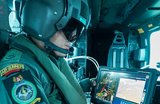Raytheon's GPS receiver tested aboard B-2
The US Air Force (USAF) has tested its next-generation military-code Global Positioning System (GPS) using a Raytheon receiver aboard a B-2 Spirit aircraft, the company announced on 5 December.
The testing, carried out at Edwards Air Force Base, California, is part of the US government's programme to modernise GPS by improving security, positioning, navigation and timing capabilities for military and civilian applications. Military GPS User Equipment M-code receivers will give military aircraft, ships and ground vehicles access to the modernised GPS network.
The tests verified the integration of a Military GPS User Equipment-equipped risk reduction prototype of Raytheon's Miniaturised GPS Airborne Receiver MAGR-2K-M receiver with B-2 systems in representative flight and mission profiles.
Rick Yuse, president of Raytheon Space and Airborne Systems, said: ‘M-code receivers unlock the next-generation GPS network for military users. This test demonstrated M-code capability onboard the B-2 for the first time, marking an early milestone for the overall GPS modernisation effort.’
Raytheon is developing M-code receivers under a contract with the USAF Directorate GPS User Equipment Division. The company is also contracted with the USAF Joint Service Systems Management Office to qualify and certify the MAGR-2K-M and deliver production representative units to support platform integration and testing.
More from Digital Battlespace
-
![Thales looks to boost DigitalCrew system through AI and human-machine teaming trials]()
Thales looks to boost DigitalCrew system through AI and human-machine teaming trials
The Thales DigitalCrew package, first unveiled at last year’s Defence IQ International Armoured Vehicles conference, is designed to merge imaging and apply a layer of decision-making and observation algorithms to support crew and other personnel.
-
![Babcock nears first customer for Nomad AI translation tool]()
Babcock nears first customer for Nomad AI translation tool
Nomad can provide militaries with real-time intelligence, saving critical time on the battlefield.
-
![AUSA 2025: Israel’s Asio Technologies to supply hundreds of improved Taurus tactical systems]()
AUSA 2025: Israel’s Asio Technologies to supply hundreds of improved Taurus tactical systems
Taurus operates alongside the Israel Defense Forces’ Orion system which supports mission management across tens of thousands of manoeuvring forces, from squad leaders to battalion commanders.
-
![AUSA 2025: Kopin pushes micro-LED plans as China moves faster]()
AUSA 2025: Kopin pushes micro-LED plans as China moves faster
The plan for the new displays follows fresh investment in Kopin’s European facilities by Theon and an order for head-up displays in fielded aircraft, with funding from the US Department of Defense.
-
![AUSA 2025: Persistent Systems to complete its largest order by year’s end]()
AUSA 2025: Persistent Systems to complete its largest order by year’s end
Persistent Systems received its largest ever single order for its MPU5 devices and other systems earlier this month and has already delivered the 50 units to the US Army’s 4th Infantry Division.

























